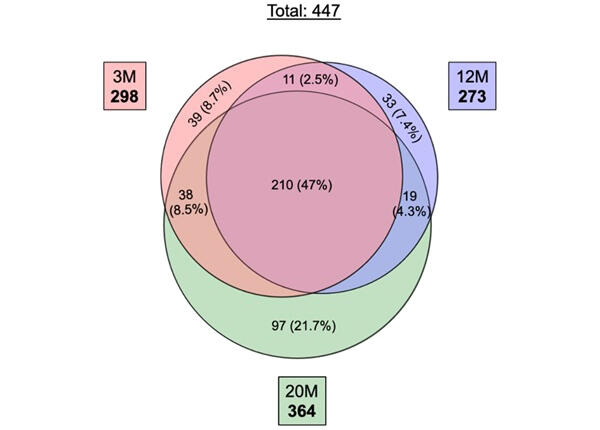Sperm degradation due to paternal aging is linked to an increased risk of neurodevelopmental disorders in the offspring. The underlying mechanism for this phenomenon includes changes in histone modifications and DNA methylation during sperm formation. A research group led by Professor Noriko Osumi of the Graduate School of Medicine at Tohoku University demonstrated that changes in sperm microRNA profiles are also linked to the regulation of genes related to neurodevelopmental disorders. Osumi stated, "If a more accurate sperm quality assessment method using epigenetic alterations as markers is possible, a new assisted reproductive technology that improves sperm quality through lifestyle modification or medication could be available." The study results were published in the Epigenetic Inheritance collection in Scientific Reports.

License: Original Content. Credit: Kazusa Miyahara et al.
Japan is currently undergoing aging in its population and a rapid decline in its birthrate, with the expected number of births in 2023 estimated to be in the range of 700,000-750,000. A major factor contributing to the decrease in births is late marriage. An increase in births to older mothers has doubled the number of children with neurodevelopmental disorders and resulted in babies with a lower birth weight, which eventually leads to a lower average height in adulthood.
In the past, oocyte aging was considered to be the major issue. However, in recent years, a decline in sperm counts and normal sperm due to aging has been shown to have a large impact. For example, epidemiological studies have repeatedly found that paternal aging has a larger impact than maternal aging does on risks of developing neurodevelopmental disorders, including autism spectrum disorder.
Previously, the research group had revealed that paternal aging in mice affects inherited genetic risks differently and that mouse offspring from old fathers have a lower number and less variety of squeaks. Old fathers had been found to produce more atypical individuals. By focusing on sperm epigenome variations, the research group identified abnormalities in histone modifications and DNA methylation due to aging. However, the effects of microRNAs, epigenetic factors crucial in gene regulation, were unknown.
In the current study, the research group performed a comprehensive analysis of alterations of microRNAs in mouse sperm due to aging. MicroRNAs in sperm of 3-, 12-, and 20-month-old mice were compared, and those with altered expression levels were identified. In each respective group a total of 298, 273, and 364 microRNAs were expressed, 210 of which were common among the three age groups and the rest varied according to age. A comparison of the microRNA expression profiles of sperm of different ages led to the identification of microRNAs that exhibited a more than two-fold upregulation or downregulation in expression levels because of aging. Many of the target genes of these differentially expressed microRNAs were related to cell death processes, such as apoptosis and caspase B dimerization, or were neuronal genes related to pathways such as "Transmission by Chemical Synapses."
The research group then examined the correlations between genes related to autism spectrum disorder and the microRNA expression levels. They found that Oxtr and Gabrb2, which are genes important for brain function, were negatively correlated with microRNAs that exhibited aging-related altered expression levels. These findings indicated that microRNAs increase with age, and their suppression of normal genes activates the genes related to autism spectrum disorder. Furthermore, microRNAs detected in patients with autism spectrum disorder were also found to be expressed in mouse sperm, and their expression levels increased with age. As these microRNAs are reportedly transmitted to fertilized eggs, the findings suggest that the alterations in sperm microRNAs due to paternal aging may affect the growth and development of the offspring.
Journal Information
Publication: Scientific Reports
Title: Investigating the impact of paternal aging on murine sperm miRNA profiles and their potential link to autism spectrum disorder
DOI: 10.1038/s41598-023-47878-z
This article has been translated by JST with permission from The Science News Ltd. (https://sci-news.co.jp/). Unauthorized reproduction of the article and photographs is prohibited.




